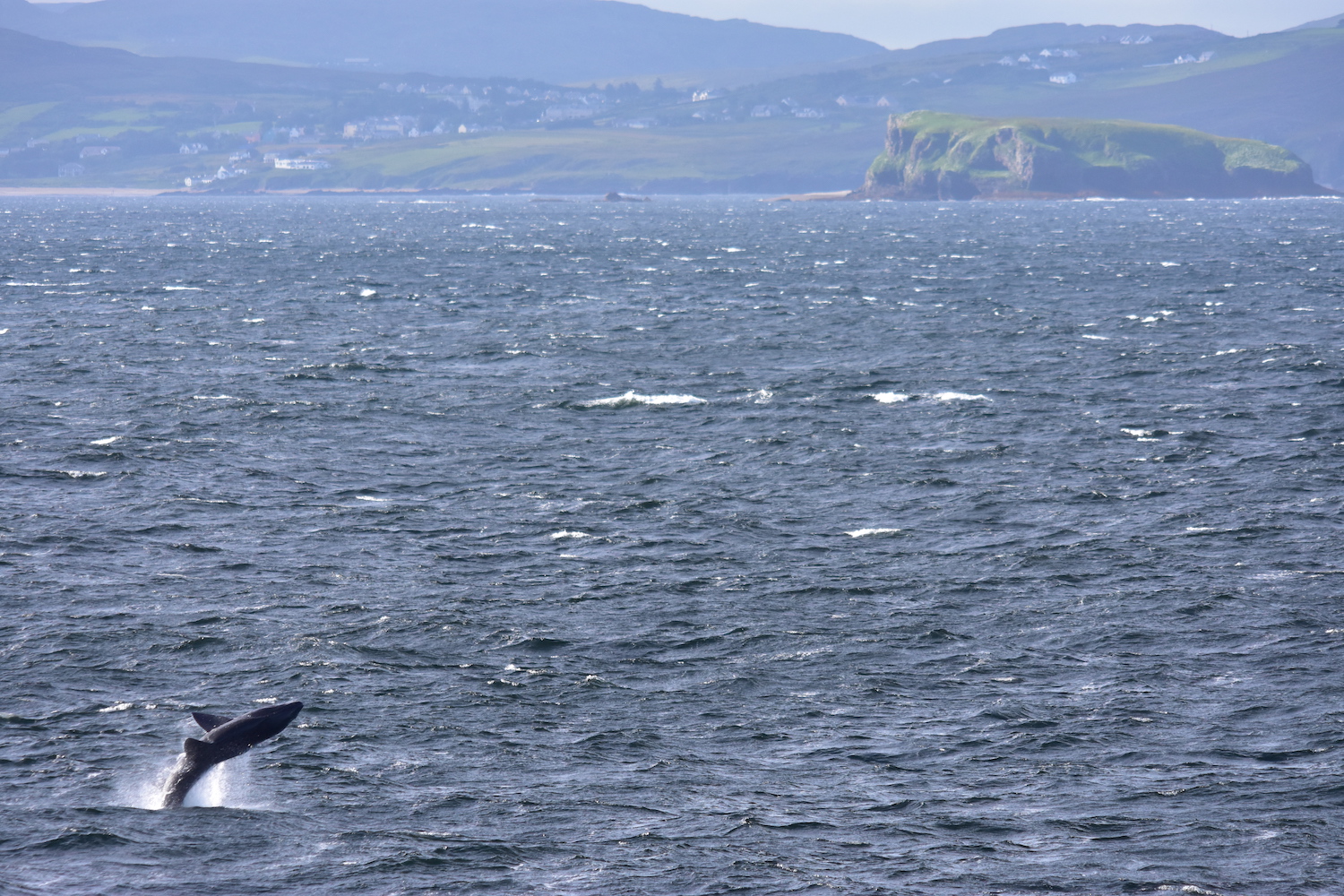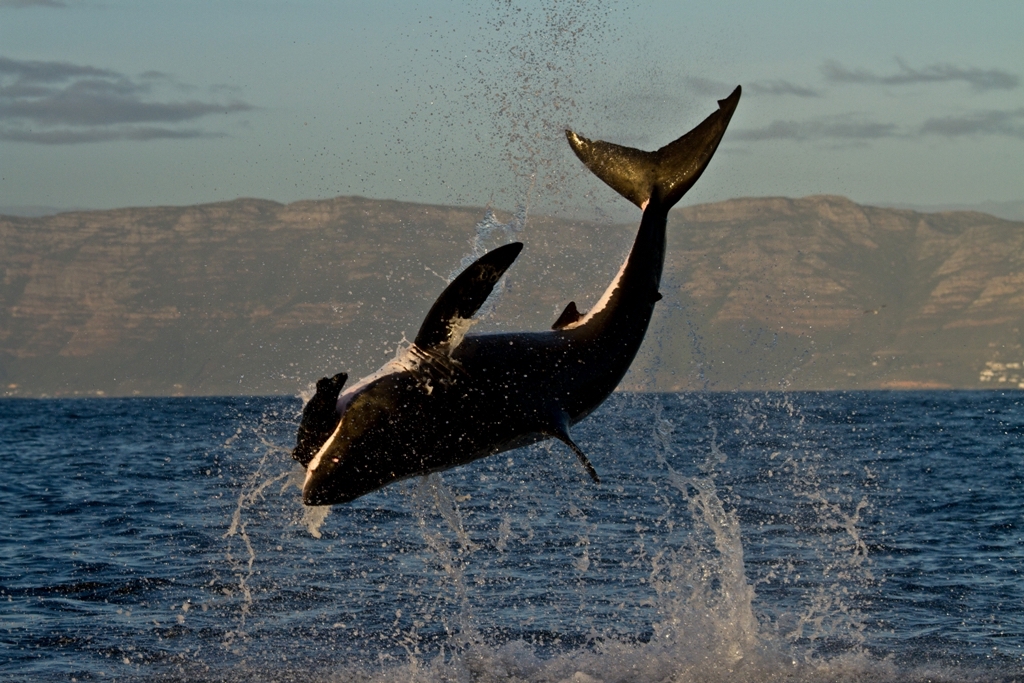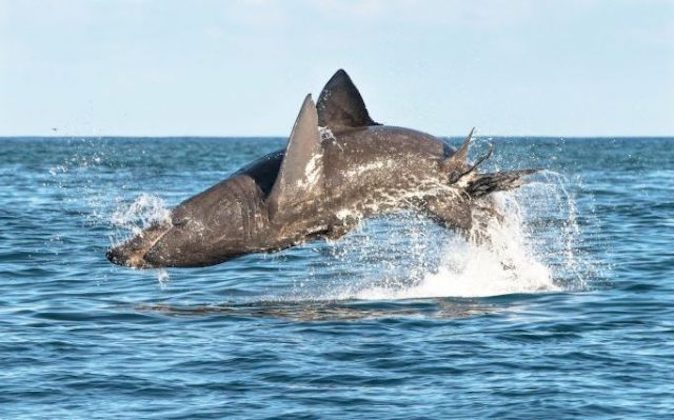World's 2nd-Largest Shark Has an Olympic-Worthy Secret
The basking shark — known for its languid, filter-feeding lifestyle — has an Olympic-worthy secret: It can hurl its body out of the water just as fast and as high as its predatory cousin, the great white shark, a new study finds.
Basking sharks (Cetorhinus maximus) are the second-largest sharks in the world, measuring up to 33 feet (10 meters) long. But basking sharks' enormous girth doesn't stop them from reaching top speeds of 11 mph (18 km/h) and jumping to a peak height of 4 feet (1.2 m) above the water, the researchers found.
In comparison, great white sharks (Carcharodon carcharias) reach speeds of 10.7 mph (17.2 km/h), the researchers said. [Images: Sharks & Whales from Above]
Though unexpected, this discovery doesn't mean that "basking sharks are secretly fierce predators tearing round at high speed," study senior researcher Jonathan Houghton, a senior lecturer in marine biology at Queen’s University Belfast, in Northern Ireland, said in a statement. "They are still gentle giants munching away happily on zooplankton."

The researchers analyzed data and video recordings they took of a 26-foot-long (8 m) basking shark that breached the water at Malin Head, Ireland, in 2013, as well as more than 90 hours of video they collected of 600 breach events at the same location in 2015.
The basking shark they recorded in 2013 had impressive stats. In slightly more than 9 seconds and 10 tail beats, it accelerated from a depth of 92 feet (28 m) to the surface and jumped almost vertically out of the water, the researchers said. It then stayed out of the water for 1 second before splashing back down into the waves.
This feat required a lot of work on the shark's part. The fish had to increase its tail beat frequency sixfold compared with when it was simply cruising around, gulping down plankton. Its top speed of 11 mph is twice as fast as the average speed seen in the Olympic men's 50-meter (164 feet) freestyle swim, the researchers noted.
Sign up for the Live Science daily newsletter now
Get the world’s most fascinating discoveries delivered straight to your inbox.
Other videos of basking sharks and great whites showed similar breaching speeds, the researchers said.

It's unclear exactly why basking sharks do these gold-medal jumps, but in their predatory cousins, great white sharks, the behavior is thought to be a form of communication, at least when prey is absent. (Great white sharks are also known to rapidly breach the water while sneaking up on agile prey, such as seals.)
Perhaps basking sharks breach as a way to signal dominance, perform mating displays or indicate that there are large amounts of prey nearby, the researchers said. Or maybe it helps them remove parasites or evade predators, they added.
"It simply shows there is far more to these sharks than the huge swimming sieves we are so familiar with," Houghton said. "It's a bit like discovering cows are as fast as wolves (when you’re not looking)."
The research team also included biologists from the University of Roehampton, in London; Trinity College Dublin; the University of Cape Town, in South Africa; the Irish Basking Shark Study Group; and the South African Institute for Aquatic Biodiversity. The study was published online Sept. 12 in the journal Biology Letters.

Original article on Live Science.

Laura is the archaeology and Life's Little Mysteries editor at Live Science. She also reports on general science, including paleontology. Her work has appeared in The New York Times, Scholastic, Popular Science and Spectrum, a site on autism research. She has won multiple awards from the Society of Professional Journalists and the Washington Newspaper Publishers Association for her reporting at a weekly newspaper near Seattle. Laura holds a bachelor's degree in English literature and psychology from Washington University in St. Louis and a master's degree in science writing from NYU.









